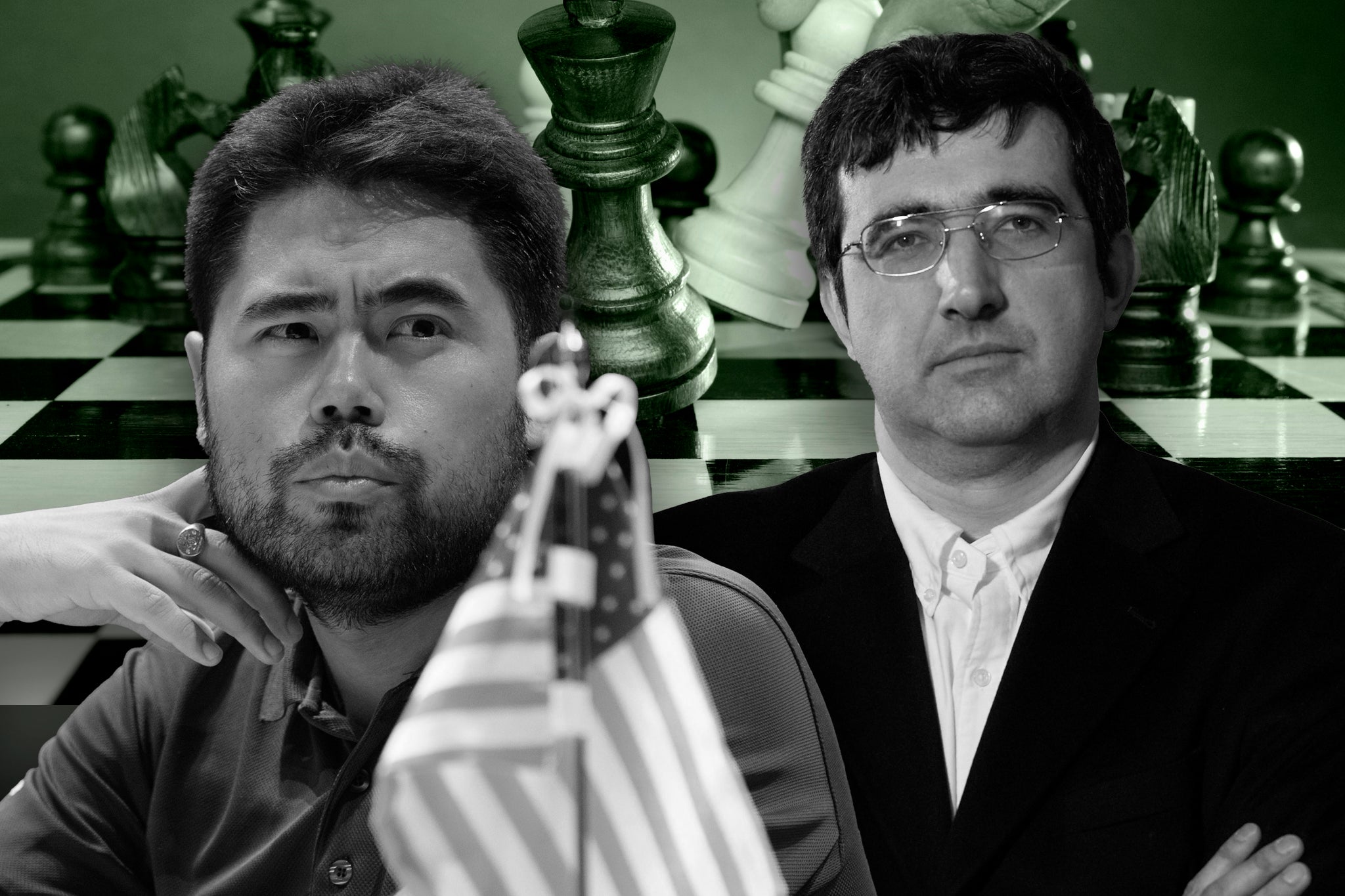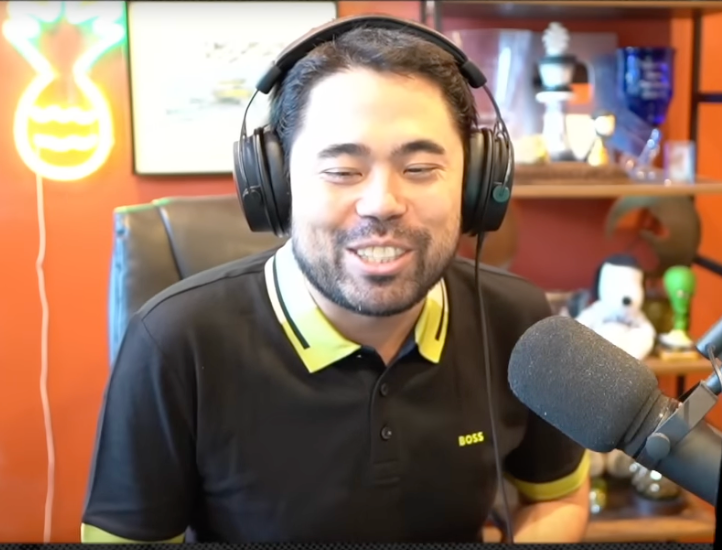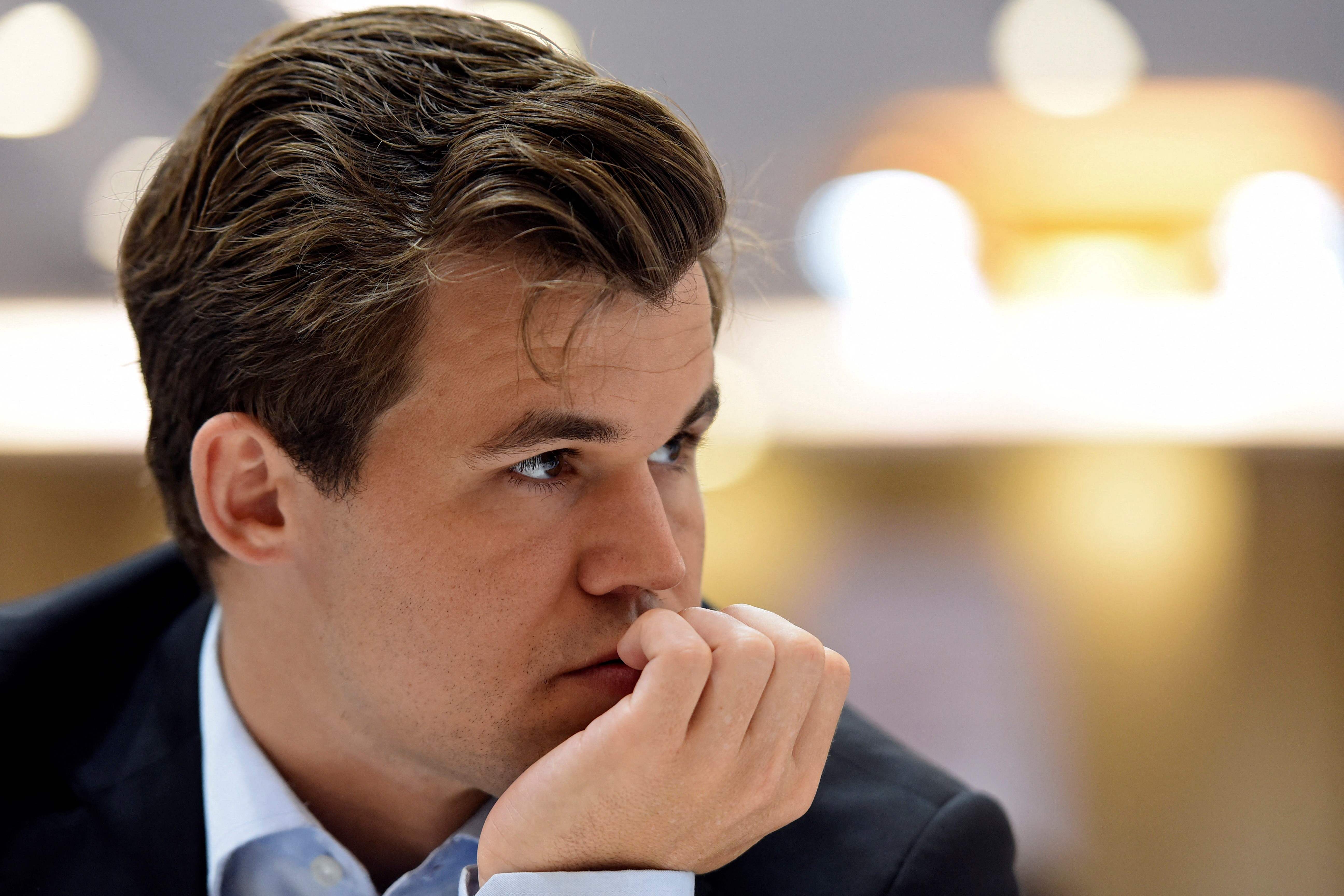The generational chess battle between grandmasters playing out on YouTube
US grandmaster and social media star Hikaru Nakamura was accused by a rival of cheating after a hot winning streak. The outcry exposed a generational rift between top chess players, Bevan Hurley reports


Hikaru Nakamura plays chess like he talks — at a hundred miles an hour.
The 35-year-old grandmaster has been one of two top-ranked US players for more than a decade and livestreams rapid fire games of online blitz chess while explaining the logic behind his moves to his millions of fans on platforms like Twitch and Kick.
Recently Mr Nakamura went on an unbeaten 46-match streak against ranked opposition in a competition on Chess.com, the world’s largest online platform. Most in the chess world applauded — but the streak also drew accusations of cheating from a Russian foe.
Vladimir Kramnik, a former world champion, cryptically claimed in a blog post that the series of victories was suspicious and merited closer examination by moderators on Chess.com.
Mr Nakamura furiously denied the allegations, telling his 2.2 million YouTube subscribers that Mr Kramnik was cherry picking selective data to “sow seeds of doubt” about the integrity of the game.

The dispute appears to have exposed a generational rift between traditionalists who favour in-person matches and younger, digital-savvy players who grew up playing chess online.
“Younger players think in a completely different manner,” Yuri Garrett, chairman of the International Chess Federation (FIDE)’s Fair Play Commission, told The Independent in an interview. “And their muscular memory is different when it comes to moving a mouse on the chessboard.”
After more than a week of escalating trash talk between the two grandmasters, Chess.com cleared Mr Nakamura of wrongdoing on Thursday 29 November, saying in a statement that it had carefully examined the winning streak and found that Mr Kramnik’s claims “lack statistical merit”.
Professor Kenneth Regan, a computer scientist who is the world’s foremost expert on “e-doping” in chess, also conducted a review of the games and found Mr Nakamura’s results were well within the likely statistical range for a player of his calibre.
Professor Regan told The Independent that the victories could be explained by the US player’s high risk style of play in blitz chess, which typically involves unsettling opponents with unorthodox openings to “get the battle on earlier”, and prevent them from following memorised moves.
The professor uses an analogy from the sport of cricket, where playing conditions can vary wildly depending on the playing surface, known as the wicket.
“A century hit on a sticky wicket is a lot harder than a century hit on a bare sun-baked wicket that is giving the bowlers nothing. That happens in chess as well, and basically Nakamura creates the stickiest wicket.”
E-doping
The latest supposed cheating scandal to roil the chess world began with a 20 November post on Chess.com by Mr Kramnik, a Russian grandmaster and former world champion.
Mr Kramnik called into question a stunning streak of 45 wins and one draw by an unnamed player in a popular online blitz chess competition known as Titled Tuesday.
The thinly-veiled reference was clearly aimed at Mr Nakamura, the world’s fourth ranked player and five-time US champion who has gained more than four million followers through his livestreams of competitive games, and who recently had a streak of 45 wins and one draw.
“I believe everyone would find that interesting,” Mr Kramnik wrote in a since-deleted post on Chess.com, noting that it was statistically unlikely to have that many wins.
The claims were seized on by 2023 world championship finalist Ian Nepomniachtchi, who shared a screenshot of the post on social media, adding mysteriously: “Because he’s the hero Gotham deserves, but not the one it needs right now.”
Mr Nakamura hit back the next day, calling on Mr Kramnik to “just come out and say what you’re trying to say”.
Mr Nakamura claimed to have been the target of a malicious whispering campaign from the Russian player for months. “I think he’s doing it to undermine chess,” he said in one YouTube video.
The war of words escalated when Mr Kramnik then claimed he had uncovered evidence of Mr Nakamura’s winning performances having an “extremely low mathematical probability”.
Mr Nakamura again took to YouTube to rebut the accusations, suggesting that Mr Kramnik was on a personal vendetta fuelled by jealousy.
“Someone doesn’t get to say these things without actual proof. They don’t get to falsely accuse people over and over again without having to pay a price,” he told YouTube viewers.
He then answered his critics in emphatic fashion by winning 43 blitz chess games in a row.
“This is insane,” the GothamChess X/Twitter account wrote in a viral post. “He is clearly sending a message regarding the recent comments from Vladimir Kramnik.”
Mr Nakamura made his own tongue-in-cheek post on X: “Given everything that’s happened, I think to prove my ability, I should have to record myself playing, verbally explaining the logic behind all of my moves, while also playing very fast.”
Given everything that's happened, I think to prove my ability, I should have to record myself playing, verbally explaining the logic behind all of my moves, while also playing very fast.
— Hikaru Nakamura (@GMHikaru) November 28, 2023
Wait a minute...https://t.co/bMKuOqBcSO Come watch to keep me honest 😆
Undeterred, Mr Kramnik started a petition on Change.org demanding that Chess.com perform a “detailed investigation” into Mr Nakamura’s “abnormal results”. He later claimed on his Chess.com blog that he was subjected to physical threats and intimidation because of his allegations against Mr Nakamura.
The Independent has attempted to reach Mr Kramnik. Mr Nakamura did not respond to a request for comment.
Mr Regan, a University at Buffalo professor of computer science, is sometimes referred to as the “chess detective” and has been probing claims of “e-doping” in the sport for decades.
He told The Independent he had examined Mr Nakamura’s hot streak after the cheating claims were aired, and that the champ’s results were well within the likely statistical range.
The data suggested that Mr Nakamura had played “a tad” better than expected, while his opponents performed slightly worse than their Chess.com ratings would have predicted.
Generational divide
In part the disagreement may involve the way offline and online chess is viewed. Professional in-person chess tournaments are subject to far more stringent security measures than online games, Mr Garrett from FIDE told The Independent.
Players entering a playing hall in a top FIDE tournament pass through metal detectors, thermal imagery scanning, and are subjected to thorough searches of their person and belongings.
“It’s easier to pass an airport checkpoint than to get into a playing hall,” Mr Garrett told The Independent.
“I’m not saying it’s impossible to cheat, I’m just saying it’s very, very hard.”
While FIDE has no jurisdiction over how Chess.com games are run, Mr Garrett said that online chess games have completely different mechanics to in-person play.
“Someone like Hikaru was born with online chess,” Garrett said. “I would expect him to have an understanding or instinct which someone like Kramnik doesn’t have, and play online chess in a way that is more intuitive.”
Mr Garrett said that the intensely competitive nature of the game and the mere suggestion of having access to chess engine software meant that outstanding performances from young players instantly aroused suspicion.

A year ago former World Champion Magnus Carlsen stunned the chess world by accusing his 20-year-old American opponent Hans Niemann of cheating (yes that was the one with the anal bead accusations).
Mr Garrett said that the media attention that comes when cheating claims are aired shows the enduring popularity of the sport.

“But we don’t like it when players go public with allegations, because you either have hard evidence or you are tainting someone else’s career,” he said.
During Covid, the 1500-year-old game experienced an explosion in popularity. Between January 2020 and February 2023, more than 100 million users signed up to Chess.com, also spurred in part by the popularity of the Netflix hit The Queen’s Gambit.
With most players stuck at home during the pandemic, cheating became a “major problem”, Mr Regan said.
The past three years have been good for chess on the whole, says Mr Regan, but the claims of cheating have brought reputational challenges.
“It’s testing the adage that no publicity is bad publicity. I’m not happy to see it,” he told The Independent.
Days after the allegation were made against Mr Nakamura, Chess.com issued a statement saying it had conducted testing and maths simulations to probe the player’s hot streak and found no incidents of cheating.
“We have found that not only is a 45 game winning streak possible, it is in fact likely given the number of games played.”
The site said it carefully monitored cheating and had closed more than 54,000 accounts in October alone, including six elite players.
“We have closed hundreds of titled players, dozens of grandmasters, and four players in the top 100,” the statement read.
‘Do I look like I’m worth $50m?’
Mr Nakamura, 35, was the youngest American in history to achieve grandmaster status at the age of 15, and has embraced social media and streaming to bring the sport to a wider audience.
In one recent video, the Florida-based player mocked claims online that he was the wealthiest chess player in the world with a reported net worth in the tens of millions.
“Do I look like I’m worth $50m? I’m literally wearing Hawaiian shirts you guys, if I was worth $50m I would probably have a $500 chainmail like something from Lord of the Rings.”
Mr Regan told The Independent that the fast-talking American had been a breath of fresh air for the sport.
“Some people find him brash, I don’t. He speaks well at the level of his audience, popularises chess, he’s also been bringing the goods.”
Mr Nakamura has beaten Mr Carlsen, the world’s top player, on several occasions, and came within one game of qualifying for the World Chess Championship held in Kazakhstan in April.

At 48, Mr Kramnik comes from a different generation.
As an 18-year-old, he defeated Garry Kasparov in their first classical chess game in 1994 and went on to become the youngest world champion two years later. The six months he spent as world’s top ranked player that year was the only period Mr Kasparov was dethroned between 1986 and 2006.
Mr Kramnik is also no stranger to allegations of foul play. In 2006, he was accused of making unauthorised bathroom trips during his World Championship victory over Bulgarian grandmaster Veselin Topalov.
In September, Mr Kramnik quit Chess.com claiming the site was riddled with “obvious cheaters” after losing to Mr Niemann in the Champions Chess Tour Play-In event.
“Nothing is done to clean the platform from those small crooks,” he said in a blog post at the time.
Around the same time, chess was rocked by one of the more bizarre stories of the year when Norwegian world champion Magnus Carlsen accused 20-year-old American Hans Niemann of cheating.
Mr Niemann had pulled off a major upset by defeating his higher ranked opponent in round three of the 2022 Sinquefield Cup on 2 September.
In a much-anticipated rematch, Mr Carlsen switched off his computer camera and conceded on the second move of a game at the Julius Baer Generation Cup days later without explanation.
After weeks of rampant speculation, the Norwegian released a statement alleging his opponent had “cheated more — and more recently — than he has publicly admitted.”
Sordid claims later emerged online that Mr Niemann may have used artificial intelligence, vibrating shoes or even carefully-placed anal beads to receive buzzing signals.
Mr Niemann had publicly admitted cheating twice earlier in his career. But in a 72-page report released last October, Chess.com claimed he had probably received illegal assistance in more than 100 online games.
Mr Niemann then filed a $100m lawsuit in Missouri against Mr Carlsen, Chess.com and other defendants for “egregiously defaming him and unlawfully colluding to blacklist him”.
The lawsuit was thrown out. Mr Carlsen withdrew from the 2023 World Chess Championship, which saw Chinese grandmaster Ding Liren defeat Mr Nepomniachtchi.
Mr Carlsen weighed into the latest controversy where he jokingly mocked Mr Nakamura over cheating claims.
He posted a screenshot from a match he was playing against Mr Nakamura which showed him giving up his bishop to a pawn – a game which Mr Carlsen would go on to win.
“Wins all these online events, yet doesn’t know how pawns capture? Interesting,” Mr Carlsen joked.
Bot or not
Players have used computer programmes and electronic devices to cheat since the 1980s, with regulators often struggling to keep up.
In seeded online tournaments, players are filmed from multiple angles to ensure they’re not receiving illegal signals.
Mr Regan says there are a few telltale patterns that can expose the use of bots.
“If the playing interface receives a bunch of consecutive clicks in the exact centre pixel of a square, then we know that a bot and not the human hand is playing the move.”
Automated programmes that simulate human hand movements are constantly being developed, he says.
Advances in artificial intelligence also risks creating a new arms race as cheaters look for ways to game the system.
Despite this, chess is seen as an important testbed for launching artificial intelligence ideas.
“The architecture for Chat GPT has definite affinity with finding the next move in a chess game,” he said.
The cheating detective says he hopes the furore forces the sport’s governing body to invest more in data science and technology, just as other sports like football have done.
Join our commenting forum
Join thought-provoking conversations, follow other Independent readers and see their replies
Comments
Bookmark popover
Removed from bookmarks